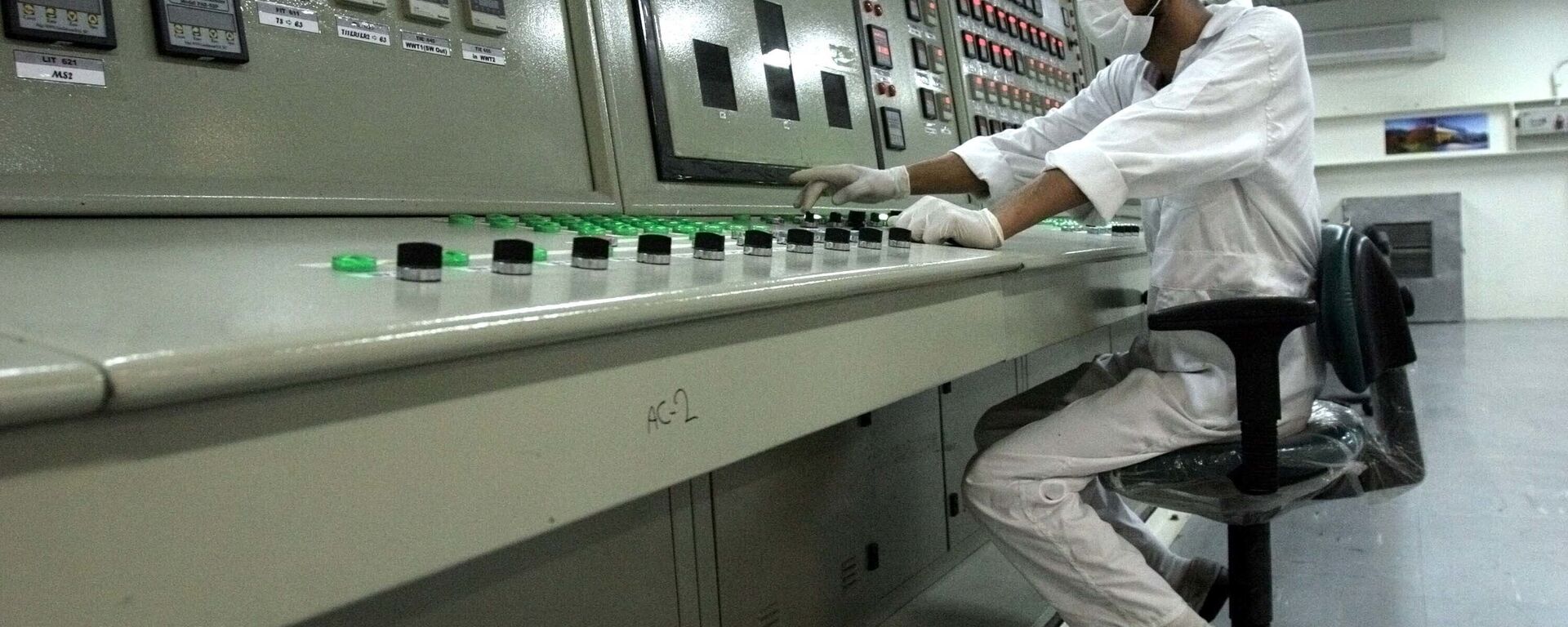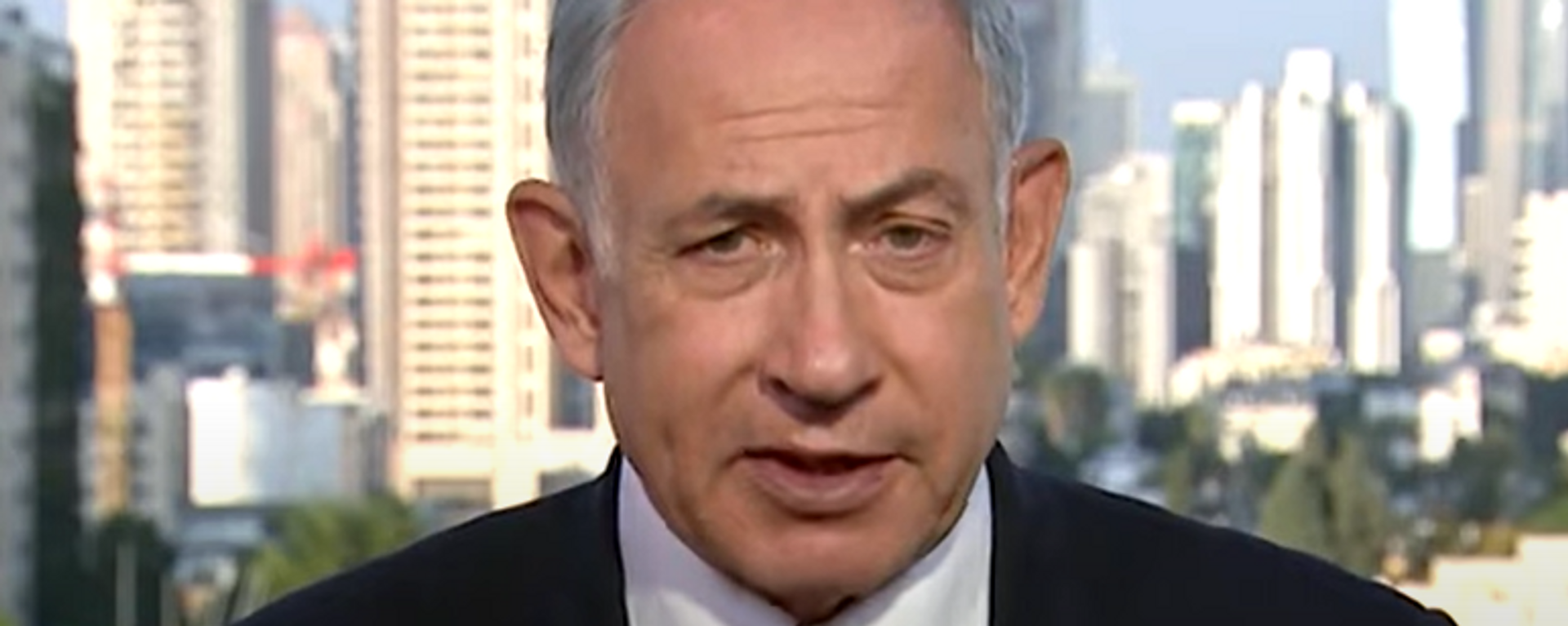https://sputnikglobe.com/20230616/us-iran-quietly-seek-to-cool-tensions-with-understanding-on-tehrans-nuke-program---report-1111203849.html
US, Iran Quietly Seek 'Understanding' on Tehran's Nuke Program - Report
US, Iran Quietly Seek 'Understanding' on Tehran's Nuke Program - Report
Sputnik International
The administration of US President Joe Biden is in talks with the Islamic Republic of Iran, seeking a "cooling-down understanding" on Tehran’s nuclear program, according to a media report.
2023-06-16T08:40+0000
2023-06-16T08:40+0000
2023-06-16T09:03+0000
world
us
iran
joint comprehensive plan of action (jcpoa)
jcpoa
https://cdn1.img.sputnikglobe.com/img/07e7/06/10/1111202944_0:215:2877:1833_1920x0_80_0_0_aef9b8374effe56d20d18929e6f0f95e.jpg
The Biden administration is in talks with the Islamic Republic of Iran on Tehran’s nuclear program, Reuters reported, citing anonymous sources among Western and Iranian officials. After stalled attempts to resurrect the 2015 Joint Comprehensive Plan of Action (JCPOA) nuclear deal, which the then Trump White House walked out on in 2018, Washington and Tehran are reportedly believed to be looking at something more along the lines of an "understanding" rather than an agreement.Since many in the US Congress would oppose any major concessions to Tehran, Washington is purportedly hoping to restore some limits on Iran’s nuclear program in return for benefits that would not require Congressional review."I'd call it a cooling-down understanding," a Western official was cited as saying. The same source confirmed that National Security Council Coordinator for the Middle East and North Africa Brett McGurk and Iran's chief nuclear negotiator, Ali Bagheri Kani, had met more than once in Oman for indirect US-Iran talks. US Special Envoy for Iran Rob Malley and Iranian Ambassador to the United Nations, Amir Saeid Iravani, are also said to have met face to face of late.As for the benefits offered to Iran in return, these would ostensibly include "substantial transfer" of Iranian funds frozen in international accounts as part of sanctions. The cited Western official added that the US sought to deter escalation between Israel and Iran."If (the) Iranians miscalculate, the potential for a strong Israeli response is something that we want to avoid," he said.Initially, after the Biden administration came to power and signalled its desire to rekindle the JCPOA deal, Iranian negotiators had held out hope for a speedy restoration of Washington's participation in the agreement. But after rounds of indirect talks, the effort stalled, with the US refusal to lift sanctions against the Islamic Revolutionary Guard Corps (IRGC) turning out to be one of the central stumbling blocks.However, rumors have circulated recently of an “interim” deal or “mini-deal” between the US and Iran. State Department spokesman Matt Miller dismissed the reports, but did state that Washington would, "continue to use diplomatic engagements” to pursue its “goals." The media reported that the latter included de-escalation of tensions, curbing Tehran’s nuclear program, expanding cooperation with international nuclear inspectors, and a "halt” of attacks on American contractors illegally operating in Syria, as well as in Iraq, by Iran's allied militias, and the release of detained US citizens.The source had added that US sanctions waivers for Iran to export oil might be in the pipeline, in return for ceasing 60% uranium enrichment and a readiness by Iran to boost cooperation with the International Atomic Energy Agency (IAEA).Amid the reports, House Foreign Affairs Committee Chairman Michael McCaul sent a letter to President Joe Biden, citing “concern” over “revelations that the administration is pursuing a new nuclear deal with Iran, calling into question the administration’s intent to adhere to its legal obligations under the Iran Nuclear Agreement Review Act of 2015.”
https://sputnikglobe.com/20230615/mohammad-marandi-new-iran-nuclear-deal-must-be-foolproof-against-violations-1111187731.html
https://sputnikglobe.com/20230614/netanyahu-confirms-us-iran-in-talks-over-new-nuclear-mini-deal---reports-1111145888.html
iran
Sputnik International
feedback@sputniknews.com
+74956456601
MIA „Rosiya Segodnya“
2023
News
en_EN
Sputnik International
feedback@sputniknews.com
+74956456601
MIA „Rosiya Segodnya“
Sputnik International
feedback@sputniknews.com
+74956456601
MIA „Rosiya Segodnya“
iran, united states, talks, nuclear deal, nuclear agreement, talks, nuclear, negotiations, sanctions, jcpoa, uranium enrichment
iran, united states, talks, nuclear deal, nuclear agreement, talks, nuclear, negotiations, sanctions, jcpoa, uranium enrichment
US, Iran Quietly Seek 'Understanding' on Tehran's Nuke Program - Report
08:40 GMT 16.06.2023 (Updated: 09:03 GMT 16.06.2023) Recent reports have surfaced that the US and Iran have been “quietly” rekindling talks on Tehran’s nuclear program. Indirect negotiations between the sides on a return to the 2015 JCPOA deal had earlier stalled, but the media reported that the Biden administration has been seeking a spate of commitments from Iran in return for concessions.
The Biden administration is in talks with the Islamic Republic of Iran on
Tehran’s nuclear program, Reuters reported, citing anonymous sources among Western and Iranian officials.
After stalled attempts to resurrect the 2015 Joint Comprehensive Plan of Action (JCPOA) nuclear deal, which the then Trump White House walked out on in 2018, Washington and Tehran are reportedly believed to be looking at something more along the lines of an "understanding" rather than an agreement.
Since many in the US Congress would oppose any major concessions to Tehran, Washington is purportedly hoping to restore some limits on Iran’s nuclear program in return for benefits that would not require Congressional review.
"I'd call it a cooling-down understanding," a Western official was cited as saying. The same source confirmed that National Security Council Coordinator for the Middle East and North Africa Brett McGurk and Iran's chief nuclear negotiator, Ali Bagheri Kani, had met more than once in Oman for indirect US-Iran talks. US Special Envoy for Iran Rob Malley and Iranian Ambassador to the United Nations, Amir Saeid Iravani, are also said to have met face to face of late.
As to what such an informal agreement would presuppose, there are reports that it would require Iran to freeze its uranium enrichment activities at the 60-percent purity marker. The cited Western official said that an acceptable status quo would be for Iran agreeing not to cross Washington's so-called red line of enriching uranium to 90-percent purity - considered weapons grade - and not installing more advanced centrifuges.
As for the benefits offered to Iran in return, these would ostensibly include "substantial transfer" of Iranian funds frozen in international accounts as part of sanctions. The cited Western official added that the US sought to deter escalation between Israel and Iran.
"If (the) Iranians miscalculate, the potential for a strong Israeli response is something that we want to avoid," he said.
The JCPOA agreement signed by Iran, the United States, Russia, China, France, Germany, the United Kingdom, and the European Union in October 2015 had required Iran to enrich uranium only up to 3.67%. It also capped Tehran's stockpile of this material at 202.8 kg (447 pounds). The Trump administration unilaterally scrapped the agreement in 2018 and restored sanctions, with Iran ramping up its enrichment activities. Despite its nuclear enrichment efforts, Iran maintains that it has no plans to pursue nuclear weapons.
Initially, after the Biden administration came to power and signalled its desire to rekindle the JCPOA deal, Iranian negotiators had held out hope for a speedy restoration of Washington's participation in the agreement. But after rounds of indirect talks, the effort stalled, with the US refusal to lift sanctions against the Islamic Revolutionary Guard Corps (IRGC) turning out to be one of the central stumbling blocks.
However, rumors have circulated recently of an “interim” deal or “mini-deal” between the US and Iran. State Department spokesman Matt Miller dismissed the reports, but did state that Washington would, "continue to use diplomatic engagements” to pursue its “goals." The media reported that the latter included de-escalation of tensions, curbing Tehran’s nuclear program, expanding cooperation with international nuclear inspectors, and a "halt” of attacks on American contractors illegally operating in Syria, as well as in Iraq, by Iran's allied militias, and the release of detained US citizens.
"Call it whatever you want, whether a temporary deal, an interim deal, or a mutual understanding - both sides want to prevent further escalation... that will involve prisoner exchange and unblocking part of Iran's frozen assets", an Iranian official was cited as saying.
The source had added that US sanctions waivers for Iran to export oil might be in the pipeline, in return for ceasing 60% uranium enrichment and a readiness by Iran to boost cooperation with the International Atomic Energy Agency (IAEA).
Amid the reports, House Foreign Affairs Committee Chairman Michael McCaul
sent a letter to President Joe Biden, citing “
concern” over “
revelations that the administration is pursuing a new nuclear deal with Iran, calling into question the administration’s intent to adhere to its legal obligations under the Iran Nuclear Agreement Review Act of 2015.”
“I urge the Administration to remember that U.S. law requires that any agreement, arrangement, or understanding with Iran needs to be submitted to Congress pursuant to INARA,” he wrote.






